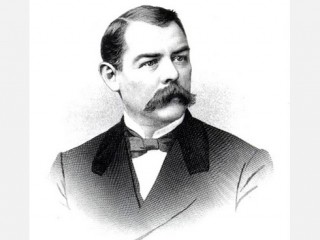
Albion Winegar Tourgee biography
Date of birth : 1838-05-02
Date of death : 1905-05-21
Birthplace : Williamsfield, Ohio
Nationality : American
Category : Famous Figures
Last modified : 2010-11-15
Credited as : Jurist and writer, civil rights advocate, novelist
Albion Winegar Tourgée, American jurist and writer, was an outspoken civil rights advocate and a novelist who pioneered in social criticism.
Albion Winegar Tourgée was born in Williamsfield, Ohio, on May 2, 1838. He attended the University of Rochester from 1859 to 1861, when he enlisted in the Union Army at the start of the Civil War. He participated in a number of important battles, including the First Battle of Bull Run, where he was wounded.
Tourgée resigned from the Army in 1864, was admitted to the bar, and moved in 1865 to Greensboro, N.C. There he became an especially controversial figure because he was one of the few white men who really accepted blacks as equals, and he often lacked tact and self-restraint in expressing his views. He was an influential delegate at the state constitutional convention of 1868 and was appointed one of three commissioners to codify the state's laws, receiving high praise for the results.
A leading Republican, Tourgée was elected to the state's superior court and served until 1875, becoming famous for his attempts to extend justice to the blacks and his fearless denunciations of Ku Klux Klan terrorism. During this period he also published his first novels and wrote political articles. In 1878 he anonymously published a series of brilliantly written attacks on the Democrats known as the "C Letters." Because of increasing hostility, he reluctantly left North Carolina in 1879 and settled in New York.
A Fool's Errand, by One of the Fools (1879), Tourgée's most famous novel, was based on his experiences in North Carolina. It was one of a series of novels dealing with the nation before, during, and after the Civil War. These works described the conflict between Northern and Southern social concepts and were considered social criticism. Perceptive and based on personal observation, along with his other novels and short stories, they made a provocative and significant contribution to American literature. He also wrote campaign material for the Republican party, lectured, commented in newspaper columns on a variety of current events, and twice attempted to publish weekly magazines.
Tourgée continued to be a vocal and persistent advocate of black equality, in spite of increasing national indifference. He participated in the case of Plessy v. Ferguson, arguing unsuccessfully before the U.S. Supreme Court against the premise that separate but equal facilities for blacks were constitutional. (The major points in his argument became the basis for the Court's reversal in 1954.) In 1897, as a reward for having campaigned for William McKinley, Tourgée was appointed consul at Bordeaux, France, where he died on May 21, 1905.
The best available biography of Tourgée is Otto H. Olsen, Carpet-bagger's Crusade: The Life of Albion Winegar Tourgée (1965), which also gives a balanced account of Reconstruction in North Carolina.
















